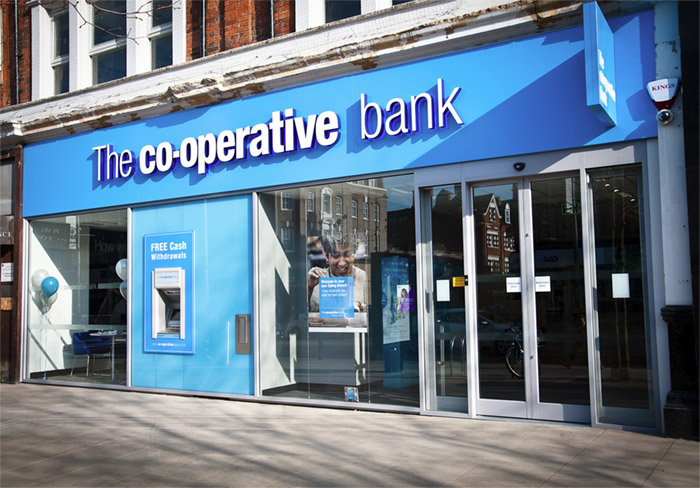This morning’s news about the continuing difficulties of the Co-operative Bank raised one obvious question in interviews and reports: will the brand survive?
The survival of the bank, in one form or another, is highly probable. It’s difficulties relate to the future ‘financial resilience’ requirements of the Bank of England rather than immediate operational issues. These requirements broadly require banks to hold a higher proportion of capital assets than has been the case in recent history so that come another financial shock they will be better placed to withstand it than they were in 2008. Getting to that threshold has proved a problem for the Co-operative Bank. A buyer with sufficiently deep pockets would get them out of this hole. The question is, however, would the Co-operative brand – associated with mutuality and ethical practice – survive or be subsumed.
Beggars, as the saying goes, can’t be choosers. Thus the survival of the Co-operative brand within the banking sector will depend on whether or not the Co-op’s buyers believe that there is commercial benefit in retaining the Co-operative message. The brand, essentially, ‘belongs’ to the Co-op Group – the one that does the supermarkets and the funeral homes as well as a few other less well known notions. To say understanding exactly how the Co-op operates is tricky is something of an understatement. Behind the retail brand is a web of locally own mutual with democratic structures that buy in to the stores in some obscure way to which most of its modern-day customers seem oblivious. Nonetheless it has a reasonably clear ‘niche’ of ‘fair-trade’ and ‘ethical sourcing’. The bank was the choice for many for similar reasons. You knew where ‘your’ money was invested. You didn’t really, because that’s not actually how banks work of make money, but they need customers and that was one way they found them.
Despite having squandered its position as the UK’s largest retail group in the 50s and 60s, the Co-op remains the seventh largest food retailer, only recently having been overtaken by discounting insurgent, Aldi. The bank clings to the brand based on 20% ownership from the Co-op group and its continuing its ethical financial policies. The uncomfortable fact, however, is that the Co-operative is a massively damaged brand.
Confidence in banking is everything. Without it banks fail to prosper and, ultimately in times of shock, just fail because banking confidence is a matter of smoke and mirrors. The difficulties of the Co-operative bank are too well documented to be easy to escape – the brand symbolises those difficulties. The Co-op Group well knows this because the difficulties of the bank, its ‘colourful’ former Chairman, Paul Flowers – the Crystal Methodist and the less than ethical activities of other bank directors damaged the brand of the entire group. The Co-op may spin its reversion to the ‘Co-op’ brand and logo of the 1960s however it likes but nobody will ever convince me that repairing the damage done by the scandals at the Co-operative Bank was not THE key driver.
So back to the original question – can the brand survive in the banking sector? My guess is not. First and foremost the damage outweighs any particular benefit the retention of the Co-op association might provide, secondly the interests of the Co-op Group would seem best served both financially and by brand association by just getting the hell out of banking and completing as far as possible the ‘cleansing’ of the Co-op brand. And finally, there are better non-mainstream brands around. Nationwide has long made a virtue of retaining its mutual status, and TSB, while not driven by ‘ethical investment’ policy plays on being the local retail banks – smaller, more trustworthy than the big players who made such a mess of it (including its former parent, Lloyds, of course. I can’t for the life of me see how the residual loyalty of a diminishing social niche could be sufficient for any suitor to outweigh the downside of retaining the Co-operative Bank as a brand. Nor can I see why it would be in the interests of the Co-op Group any longer to allow their brand to be subject to factors and owners way beyond their control. My guess is that in time and following its eventual return to the private sector, the NatWest and RBS banking brands too may have to be, erm, shredded.
The moral of this tale is that there is a point beyond which the damage done to a brand, no matter how well known, cannot easily be repaired. Brand assets, which are the stuff of real balance sheet value for many a conglomerate, need to be maintained, protected and valued. They are key elements in merger and acquisition and, for growing SMEs, need to be understood, valued and protected. Growing that asset requires strategy and day to day attention. To anybody who still thinks a brand is just a logo the carry on at the Co-operative Bank should convince them otherwise.
Public Impact advises and mentors businesses seeking to maximise brand assets, create and re-fresh their brands and develop robust brand strategies. Get in touch for a chat.
Photo: Wikipedia Creative Commons.

